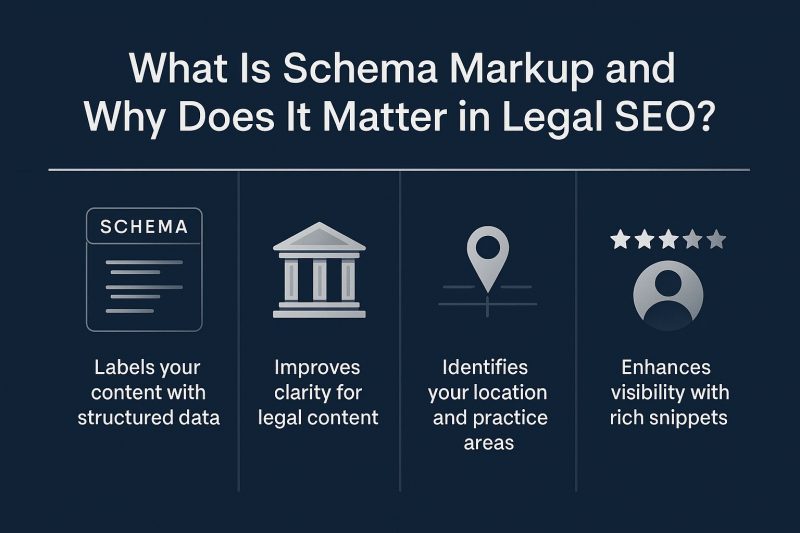Schema markup is structured data that sits in your site’s code. Google doesn’t see it like a visitor. But it reads it. And uses it to decide how to interpret, rank, and display your content.
If you run a law firm website, schema isn’t optional. It’s essential. Without it, Google has to guess what your pages mean. With it, you tell Google exactly who you are, what you do, and how your site fits into the search result landscape.
Legal SEO sits in Google’s “Your Money or Your Life” category. This means higher standards. Greater scrutiny. Schema is one way to meet those standards clearly.
You’re not just a business. You’re a law firm. Your site includes attorneys, reviews, locations, and legal advice. Schema helps separate that complexity into machine-readable structure.
It doesn’t directly boost rankings. But it expands your footprint. Star ratings, FAQ drop-downs, attorney names, review counts, location data, they all become visible elements in your search snippet.
And that’s what changes behavior. It increases trust before they click. And improves click-through rate without touching content.
In legal SEO, schema isn’t about tricks. It’s about translation. If you want Google to understand your authority, you have to speak its language.
What Is Schema Markup and Why Does It Matter in Legal SEO?
Schema is a type of structured data. It’s a way to label your content with metadata that Google can directly understand.
When you use schema correctly, you’re telling search engines, “This is a law firm.” “This is a practicing attorney.” “This is a review.” “This is an FAQ.”
Without schema, Google guesses. With schema, Google knows.
In the legal industry, that precision matters. Because legal content falls under YMYL, Your Money or Your Life. Which means Google requires higher levels of trust and clarity.
Schema markup helps meet that demand.
It allows you to tie a specific attorney to a practice area. To list your office location. To identify what type of law you practice. And even to display client reviews or FAQs directly in the search result.
This visibility matters. Users are more likely to click results with rich snippets. Star ratings. Quick answers. Attorney names.
Schema doesn’t directly boost rankings. But it does increase relevance and enhance SERP appearance.
And in a competitive market like legal, that can be the edge that pushes you one slot higher.
The Most Important Schema Types for Law Firms in 2025
Not all schema types are useful in legal SEO. Some are noise. Some are gold. If you’re running a law firm website, these are the ones that matter. These are the ones that move the needle.
Start with Organization. This tells Google that your website belongs to a legal business entity. It includes your firm’s name, logo, contact info, founding date, and areas served.
Then comes Person. This is for your attorneys. Full name. Job title. Bar association membership. Education. Practice focus. Use one schema block per attorney bio page. And make sure each one links to their related practice area pages.
Next, LegalService. Most firms skip this. That’s a mistake. This type defines what you actually do. Use it to label core services like personal injury, criminal defense, or family law. Add location, description, and areas served.
Then LocalBusiness. This helps for local SEO. Add office hours, map links, and geographic coverage. If you have multiple offices, each one should have its own LocalBusiness markup.
Use Review or AggregateRating to show client satisfaction. Displaying stars in search results increases CTR by up to 30 percent. But stay bar compliant. Never fake it.
Round it out with BreadcrumbList, FAQPage, and optionally WebPage to provide semantic clarity.
This is the foundation. If these schemas aren’t on your site, you’re playing catch-up.
How Schema Enhances Visibility Through Rich Results and Entity Clarity
Visibility isn’t just about showing up. It’s about how you show up.
Schema makes that difference. It tells Google what your site represents, and what users should see before they click.
Rich results are enhanced search listings. They include stars. Attorney names. Business hours. Practice categories. FAQs. Even sitelinks. These aren’t luck. They’re schema-driven.
Let’s say you mark up your attorney bio with Person and LegalService. Google can now connect “John Smith, Medical Malpractice Lawyer” to a physical location in Macon. If your review schema confirms satisfaction, and your LocalBusiness data confirms the location, you just built a complete entity.
That entity is stronger than a keyword.
Google sees patterns. When schema is consistent, relevant, and tied to accurate on-page content, Google treats your firm as a trusted object. Not just a webpage.
This means you may trigger a Knowledge Panel. Or dominate a query space with rich snippets.
And even if you don’t grab a featured result, the added elements, stars, drop-down answers, attorney info, make your listing stand out.
People click what looks real. Schema gives your result that shape.
That’s how you get more visibility without more content.
That’s how structured data builds brand in search.
🔥Futureproof your firm’s visibility. Talk to our attorney SEO experts today.
- Healthcare SEO vs. Law Firm SEO: A Comprehensive Comparison
- SEO Revolution in the U.S. Legal Industry
- How E-E-A-T Affects Law Firm SEO and Practical Ways to Improve It
Frequently Asked Questions
1. What is schema markup and why does it matter for legal SEO?
Schema markup is structured data that helps Google understand your content. It improves your chances of appearing with enhanced features in search results, like star ratings or FAQs.
2. Which schema types should a law firm use?
Law firms should prioritize Organization, Person, LegalService, LocalBusiness, Review, and FAQPage schemas to enhance their visibility and trust signals in search results.
3. Can schema markup directly improve search rankings?
Not directly. But it increases CTR and relevance, which indirectly supports better rankings by improving user engagement and visibility in SERPs.
4. How do I test if my schema markup is valid?
Use Google’s Rich Results Test or Schema.org validator to check that your JSON-LD or microdata is correctly implemented and eligible for rich results.
5. What happens if schema is used incorrectly?
Invalid or misleading markup can result in Google ignoring it, or in some cases, applying manual actions if it violates structured data policies.


